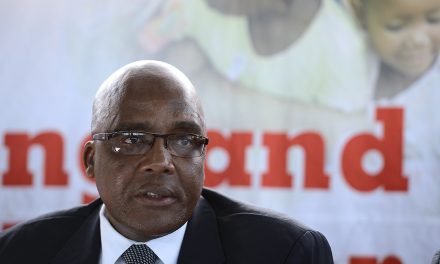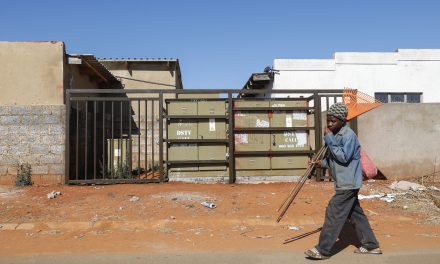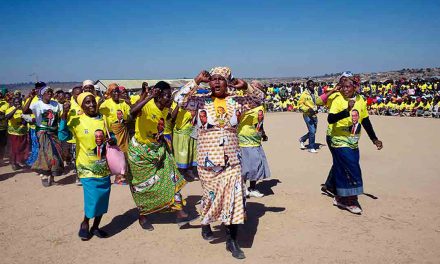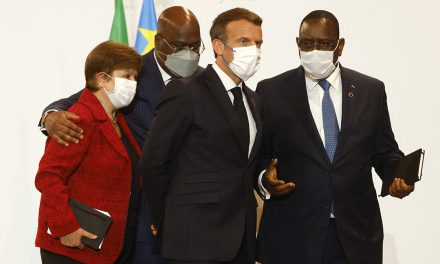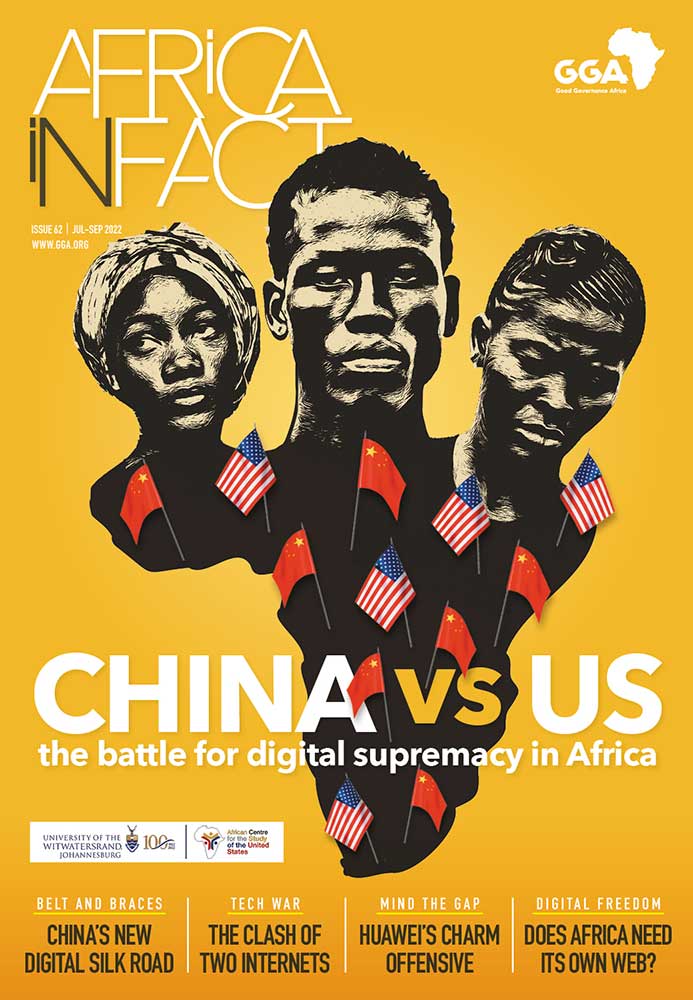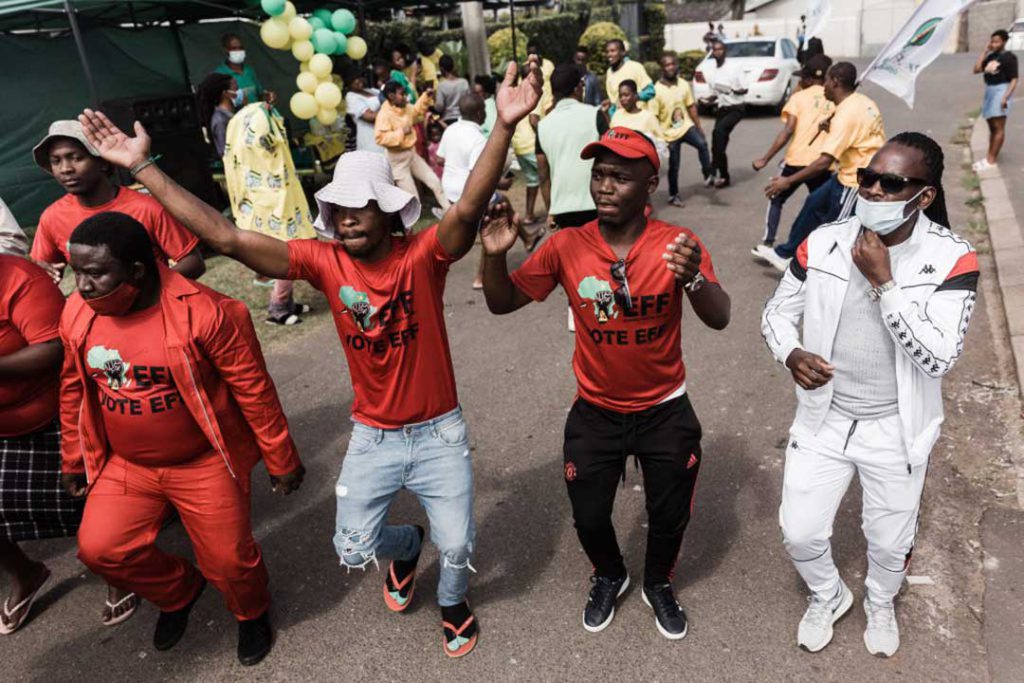
Economic Freedom Fighters (EFF) supporters sing and dance next to supporters of the African National Congress (ANC) as the former await the arrival of their leader Julius Malema during a voter registration campaign on September 18, 2021 outside the Nhlakanipho High school a voting station in Kwa-Mashu township north of Durban on the first day of voter registration. South Africa began voter registration this week-end ahead of the Local Government Elections to be held on November 01, 2021. (Photo by Rajesh JANTILAL / AFP)
Following the impasse and uncertainty over the constitutionality of moving local government elections to 2022, and the consequent Constitutional Court decision, South Africa will hold Local Government Elections (LGE’s) on 1 November 2021. The country is grappling with pressing challenges to governance at all levels. Across the board, the most evident implications are a declining economy, growing unemployment and declining public trust in institutions. The consequences are most apparent at the local level; municipalities have been in a state of perpetual decline due to maladministration. In turn, this is fuelled by perennial issues such as corruption, leading to the lack of responsiveness, and decline in quality-of-service delivery, which are most pronounced. This collapse has been reflected in many indicators, from non-payment of rates to increasing frequency of court cases and protests against municipalities over service delivery failures. Given these realities, the elections present an opportunity to elect leaders who will prioritise and entrench good governance at a local level.
The state of play
For the longest time, the local political economy in South Africa’s municipalities has been precarious. Over the past 18 months, conditions have been worsened by the COVID-19 pandemic and, more recently, the July 2021 crisis and violent looting in some municipalities in Gauteng and KwaZulu-Natal.
COVID-19
- First, the impact of the governance responses to the COVID-19 pandemic – especially the hard economic lockdowns – includes growing unemployment rates for citizens, closure of businesses, strain on the provision of services and revenue collection for municipalities.
- For constituents, the state of disaster regulations, over 500 days, has impacted opportunities for public political participation and engagement to hold elected leaders to account.
- For political parties, this has also limited the traditional modes of campaigning and engaging with the electorates through rallies, door-to-door visits, and other forums.
- Most tragically, the pandemic has resulted in the loss of lives. In some instances, this has spurred political vacuums and, eventually, change in leadership, such as the deaths of Nelson Mandela Metro Mayor Mongameli Bobani and in the Johannesburg Metro, Geoff Makhubo.
The July 2021 unrest
- Zoning into the events witnessed in July, whatever the political and economic causes that precipitated the scenes, they brought about the disruption of all-important local economies through the destruction of public infrastructure and closure of businesses which provided investment, trade, and employment opportunities in the affected municipalities.
- Undeniably, this will have a lasting effect because the disruptions and closures mean that businesses and households will not be able to pay municipal services in some localities.
- Similarly, the events have put pressure on municipal revenue and affect the ability to deliver quality services. For example, this has already been the case in the eThekwini and Ekurhuleni municipalities, where rate collection and revenue has sharply declined.
The obstacles for the Independent Electoral Commission (IEC)
The Constitution primarily enshrines free and fair elections as a cornerstone principle for how South Africa is to be governed. Despite many tests over the years, the fundamental constitutional architecture has stood firm due to the resilience of the institutions in which our democracy is rooted. However, because of COVID-19 and the associated public health risks, and the resultant unprecedented conditions of the State of Disaster, the process towards holding elections was bound to be fraught with many challenges on the part of the IEC, the constitutional body entrusted with the all-important task of managing elections, some of which are highlighted below:
- The IEC commissioned former Deputy Chief Justice (DCJ) Dikgang Moseneke to conduct an ‘Inquiry into Ensuring Free and Fair Elections during COVID-19’ and compile a report on the prospects of holding the polls initially scheduled for 27 October 2021.
- The former DCJ found that the prevailing climate is inconducive for free and fair elections to occur this October and recommended that they be postponed and deferred to a date not later than February 2022.
- Following the former DCJ’s submissions, the IEC postponed the registration weekend scheduled for 31 July and 1 August. Instead of turning to parliament to affect the necessary legislative changes to postponing the elections as prescribed, the IEC instead sought judicial authorisation and urgently approached the Constitutional Court to seek permission to hold the polls outside the constitutionally prescribed timeframe.
- The apex court mulled the decision and proclaimed that the municipal election should go ahead before or on 1 November 2021. The Constitutional Court put forth several binding prescriptions insofar as preparations on the part of the IEC are concerned.
The political players and state of affairs
The last LGEs occurred in 2016. The build-up to the 2016 elections was different due to the realities that existed five years ago. Presently, it is essential to look at the machinations within the African National Congress (ANC) as the national ruling party and the party which has overseen most municipalities. Second, the 2016 LGE’s birthed a new reality of coalition-based forms of decision making in local government, especially in key metros.
This coalition form of governance may signal a new trajectory for the future of the country’s municipalities. This makes it essential to look at other key role players such as opposition parties the Democratic Alliance (DA) and the Economic Freedom Fighters (EFF), which have governed in concert in some localities. Also worth mentioning is the emergence of smaller parties and independent candidates who have grown in numbers and might emerge as key decision-makers in this matrix.
The African National Congress
The ANC received 53% of the votes in the last LGE elections; this result was not without its challenges; the party’s share was significantly reduced across the board, from just under 62% in the 2011 elections. After the 2016 election, the ANC also lost three key metros, namely Nelson Mandela Bay, Johannesburg Metro, and the Tshwane Metro. The party is still experiencing challenges internally:
- Several recent developments point to an atrophying ANC and the party’s veering off the path of good governance, both internally, and externally. Telling, for instance, is the party’s managing of the process for candidate nomination lists. Due mainly to political battles, administrative and financial tardiness, the party failed to submit its candidate lists before the IEC’s stipulated deadline. It was facing the prospect of not fielding candidates in 93 municipalities which would have benefited the opposition.
- The Con-court ruling that the elections be held on the 1 November and the IEC’s decision to re-open the candidate list process may have given the party a much-needed lifeline, not without much criticism from some opposition parties, who accuse the Commission of being pro-ANC. There are also ongoing court challenges to the decision to re-open the registration process.
- Internally there have been conflicts over the listing process and the positioning of candidates. The process, which often turns violent, saw ANC provincial secretary in Limpopo being held hostage by aggrieved members. Party members from Mpumalanga, Limpopo and Gauteng were protesting outside the ANC’s national headquarters, Luthuli House, about issues of alleged manipulation of processes in the selection of candidates and threatened not to vote for the ANC if their candidates are not included. More standoffs and court cases between the party and disgruntled members? are still expected to play out over the next few weeks.
- In his post lekgotla briefing on the 6 September 2021, ANC president Cyril Ramaphosa acknowledged the myriad issues facing the party internally ahead of the elections, including a palatable sense of anger towards the ANC and the government the party leads.
The Democratic Alliance
The DA has governed the City of Cape Town since 2006 after wresting it from the ANC, amongst other localities in its growing portfolio. The DA’s ability to manage metros has been increasingly tested, however, especially after the 2016 elections where it was the leader in coalition governments in three other Metros. After playing the clean governance card, its record has been chequered by growing scandals levelled against some of its leaders:
- The DA has faced growing internal power struggles, which has resulted in instability, readily seen through the allegations of misconduct, votes of no confidence and resignations of Patricia De Lille in Cape Town, Herman Mashaba in Johannesburg, and Stephens Mokgalapa in the Tshwane Metro.
- Externally, through conflicts with coalition partners: the Economic Freedom Fighters (EFF), United Democratic Movement (UDM), and others cost it the Johannesburg Metro and the Nelson Mandela Bay Municipality.
- More recently, the DA announced its mayoral candidates for the battlegrounds of crucial metros.
- The party is taking the IEC to court over the re-opening of the candidate registration process.
The other parties: The Economic Freedom Front, Patriotic Alliance, Action SA, and other key players to watch
- The EFF has joined the DA’s Constitutional Court challenge against the IEC’s decision. The party has recently expressed its dissatisfaction with the government’s lockdown regulations and restrictions on political gatherings; the party also accused the SABC of bias over the lack of coverage on its events. The electoral environment has also constrained the EFF’s traditional electioneering strategies.
- The Patriotic Alliance emerged as the ‘King Maker’ in Ekurhuleni in the last election and has been setting itself up for a similar role in the Johannesburg Metro. It has been vocal and gaining a growing presence in predominantly coloured communities like Eldorado Park. Of interest, more recently, their Joburg mayoral candidate was arrested for allegedly playing a pivotal role in inciting the July violence.
- ActionSA’s Herman Mashaba, the party’s leader (and formerly of the DA), has been stoking xenophobic tensions and playing on nationalist sentiments on his path to re-claim Johannesburg’s mayoral chain and a foothold in other municipalities.
- Other parties which might have significant sway in how the tides turn include the Freedom Front Plus, The United Democratic Movement, Inkatha Freedom Party, African Independent Congress, the GOOD party and Rate Payers and Independent community associations.
The path to recovery
The state of local government is precarious. Governance at this level is a daunting task as legal, political, and social demands must be delicately balanced. Yet, the urgency of recovering effective local government cannot be overstated. For governing parties, they must better handle political contestations to limit abuse and negative impacts on the management of the municipalities’ administration. The importance of growing a sustainable politico-administrative divide across the country, especially at the local level is worth emphasising. In coalition-run municipalities, partners have in many instances been competing with one another over personality and narrow interests as opposed to building stable co-operative partnerships for good governance and advancing the interests of their citizens.
A mammoth task for the leadership who will ultimately be elected to councils will be taking meaningful action by implementing practicable policy agendas. These actors must improve the financial position of municipalities, deliver essential services effectively, reduce red tape, improve efficiency, create investment and employment opportunities, and build citizen trust for well-governed developmental nodes. A functional local government will be central towards reversing the rot and resolving the national challenges. Yet, before we can get to such discussions about practical policies and how to govern effectively, there are several issues zoned in on above, especially in parties’ conduct and their manifestos, which must articulate a solid vision for the interests of the local citizens on the road to election day.
Stuart is a Researcher in the Governance Delivery and Impact programme at Good Governance Africa. He holds a Master of Arts degree in Security and Strategic Studies from the University of Pretoria. His dissertation explored the linkages between marginalisation and insecurity, looking at the securitisation of service delivery protests in South Africa. Before joining Good Governance Africa, He was a Junior Research Fellow with the Centre for Law and Society at the University of Cape Town. Before that, he worked as a research consultant at the Institute of Security Studies with the Justice and Violence Prevention Programme and as a Junior Lecturer for the Department of Political Sciences at the University of Pretoria.


